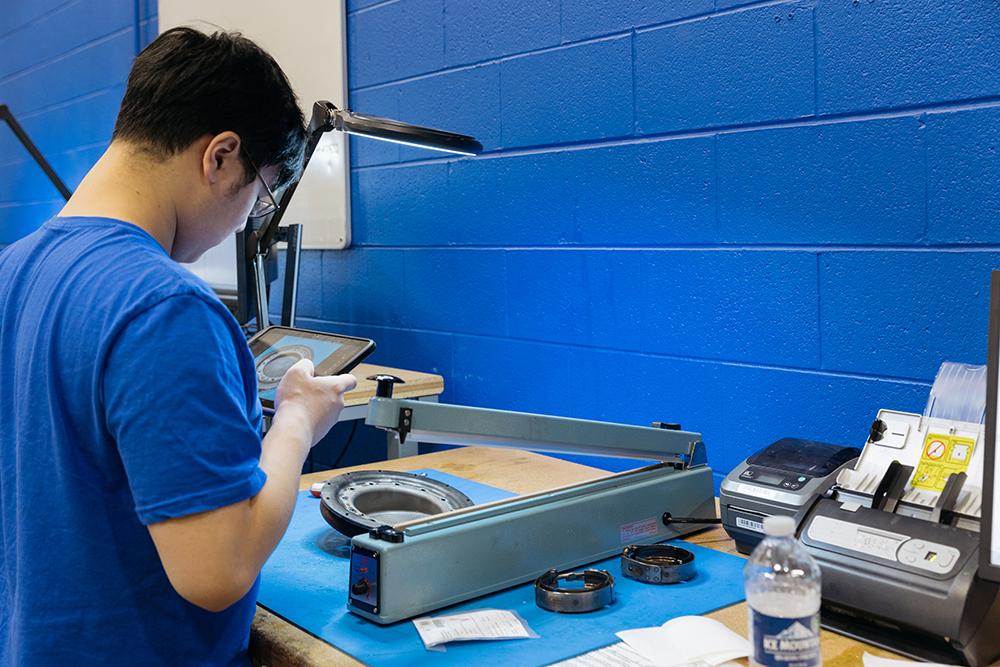MRO Stakeholders Opt For AI, Blockchain To Improve Parts Tracing

Several aftermarket companies have recently made progress in their efforts to tackle parts integrity concerns through technologies such as blockchain and artificial intelligence.
GA Telesis recently partnered with Alitheon, a startup that has developed a technology called FeaturePrint that can create unique digital fingerprints for parts using standard industrial cameras or mobile phones. FeaturePrint creates these fingerprints using optical artificial intelligence, which can detect minute surface details of physical items. Alitheon CEO Roei Ganzarski told Aviation Week Network in May that “The likelihood that one of the FeaturePrints we create will be found in another product of the same type is one in a trillion,” pointing to the fact that no two parts are identical at the millimeter to micron level.
FeaturePrint is already being used in other industries, such as automotive, pharmaceuticals, precious metals and luxury goods, for various trace and authentication purposes. Alitheon says the technology eliminates reliance on removable tags, QR codes, data plates, labels and paperwork to trace part history and authenticity.
GA Telesis intends to integrate FeaturePrint into its Wilbur parts provenance and records platform. According to Jason Reed, the recently appointed president of GA Telesis’s Digital Innovation Group, the combined technology will “establish the ultimate standard of traceability and provenance for aviation industry stakeholders.” He adds: “As the aviation industry evolves, transparency throughout the value chain is becoming increasingly critical. The enhanced GA Telesis platform will empower stakeholders to meet the highest standards set by the OEMs, airlines and aviation authorities around the world.”
Meanwhile, AFI KLM E&M and Parker Aerospace Group have rolled out a blockchain-based platform for back-to-birth tracking and tracing of aircraft parts. Using the SkyThread for Parts data sharing platform, the companies are tracking hundreds of thousands of Boeing 787 parts.
“This is a significant milestone for the aviation industry. Never have an operator and a Tier 1 OEM been able to share this depth of data,” says Jeff Smith, head of digital product programs at Parker Aerospace Group. “By leveraging blockchain technology, we can establish a comprehensive aircraft parts track and trace solution that ensures complete transparency and traceability of our parts.”
First launched in September 2022 as a software-as-a-service solution, SkyThread for Parts is now being used by companies such as AJW Technique and L3Harris. In April 2023, AFI KLM E&M signed a memorandum of understanding with the blockchain provider to implement the technology for its component services pool.
According to AFI KLM E&M, SkyThread gives it access to the history of each new and repaired Parker aircraft part, which it said in a statement will “significantly reduce the number of inbound quarantined parts, streamlining the maintenance processes and ensuring uninterrupted operations.” Parker noted that the technology should reduce repair turnaround times and improve demand planning for spares and repair volumes.
Efforts to boost parts tracing within aviation have amped up recently in response to last year’s AOG Technics records-falsification scandal. A group of major industry stakeholders—including Airbus, American Airlines, Boeing, Delta Air Lines, GE Aerospace, Safran, StandardAero and United Airlines—formed the Aviation Supply Chain Integrity Coalition earlier this year to develop better safeguards against unapproved parts. The coalition is working to deliver a final report by the end of this year that will recommend best practices to prevent unapproved parts from flying.





